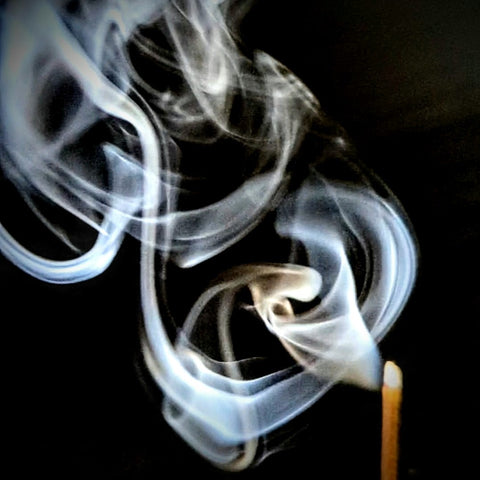Patchouli: a classic scent is getting scarce
If you’re a longtime lover of earthy, grounding scents, you may have noticed something’s off. Products with patchouli are getting harder to find—and when you do see it, the price tag might give you pause. What’s going on?
Behind the scenes, a global shortage of patchouli oil is quietly unfolding. This isn’t just a supply chain hiccup—it’s a complex, worldwide issue rooted in environmental strain, shifting agriculture, and skyrocketing demand. And yes, it’s having a real impact on our beloved incense blends here at Floré.
What is patchouli anyway?
Patchouli oil is derived from the leaves of Pogostemon cablin, a bushy herb in the mint family (Lamiaceae). That makes it a botanical cousin to herbs like rosemary, sage, thyme, and lavender—but patchouli’s scent is all its own.
Deep, musky, earthy, and often described as grounding or meditative, it’s been a staple in incense, perfumes, and natural wellness products for decades.
Patchouli is also one of those rare fragrances that ages well—its scent actually becomes richer over time. No wonder it’s become a fixture in blends that aim to calm, center, or transport the senses.
The sustainability issues behind the patchouli shortage
The heart of the patchouli story lies in Indonesia, which produces over 80% of the world’s supply. But in recent years, a perfect storm of challenges has hit farmers hard.
For starters, patchouli is a picky plant. It needs just the right balance of sun and rain to thrive—but extreme weather patterns are making that harder. Heavy rainfall and rising temperatures have caused widespread crop failure, driving yields down and prices way up.
Meanwhile, many farmers are turning to more lucrative, less finicky crops. Patchouli takes time and care to grow, and with global markets constantly shifting, it's becoming less attractive to cultivate. What little oil does get produced is in high demand—putting further pressure on supply.
And it doesn’t stop there. The soil itself is suffering.
Patchouli farming is hard on the environment:
Patchouli is incredibly demanding on farmland. It depletes the soil of nutrients quickly, which means it shouldn’t be planted over and over without giving the land a chance to recover.
Unfortunately, in many farming communities—especially in Sulawesi, Indonesia—economic pressure means fields are pushed beyond their limits.
To make matters worse, deforestation has become an unfortunate side effect of rising demand. Forested areas are being cleared to create patchouli plantations, a practice often driven by trends in the global consumer market.
Synthetic fragrances are a sustainable option:
Floré Canadian Incense is NOT 100% NATURAL. We use a few essential oils in some of our incense fragrances, but they are always mixed with synthetic oils designed to blend and bind the fragrance oils, control the burn rate and burn safely as incense.
All of our oils, natural and synthetic, are provided by Aromatics + Flavors Inc located in Scarborough Ontario. At AFI, chemists develop fragrance oils based on regulation from the International Fragrance Association.
Just because something is natural does not make it better, safer or more sustainable. The plants and trees used to extract essential oils are natural resources that must be properly managed to be sustainable.
The consequences of overharvesting includes the loss of species, habitats, and contributes to global warming and economic collapse.
White sage is an example of a natural resource that has become very popular in the wellness movement, but is at serious risk of extinction due to overharvesting. We use clary sage essential oil in our incense, a variety of sage that is easily cultivated and widely available.
Scientifically formulated synthetic fragrances are a safe and sustainable alternative to natural essential oils, and they are often far more affordable for the end consumer.
How the patchouli shortage impacts our incense
We want to be transparent with our community about what this means for Floré.
Patchouli essential oil is one of the few natural oils we use instead of a synthetic fragrance oil. We have been testing a synthetic patchouli fragrance oil as a backup plan, but even that’s in limited supply.
Patchouli Incense Sticks
This single note classic is on a production hold. Whatever we currently have made is all we have for now.
Meditation Incense Sticks
Meditation is a blend of patchouli essential oil and a custom formulated synthetic jasmine fragrance oil.
This is also on a production hold, we are not mixing any more patchouli oil with jasmine fragrance oil. Once we use what is currently mixed, no more will be made until the patchouli market stabilizes.
Protection Incense Sticks
Protection, one of our absolute bestsellers, also contains patchouli. This is a unique blend of a cool, spicy floral base fragrance oil that AFI custom created for us, in addition to a synthetic vanilla fragrance oil and a dash of patchouli essential oil.
We are using the remaining patchouli essential oil in the Protection mix until it is gone. If our tests with synthetic patchouli fragrance oil are successful we will use that while available.
Expect more volatility in the fragrance world
Patchouli will not be the only fragrance oil impacted by environmental and economic forces. As the climate warms, what can be grown where is changing. Economic factors including wars, both combat and trade wars, will impact prices and availability of many fragrances depending on where the ingredients are sourced from.
Even synthetic fragrances will be impacted as they rely on elements from the natural source.
We are doing our best to stay informed, make the best choices so that we can balance the quality of our products with sustainable practices, while keeping up with market trends and adapting to constant changes.
It is a challenging time to run a small business and we thank you for being part of the Floré community. Your support makes our incense possible.
Written by Flore





